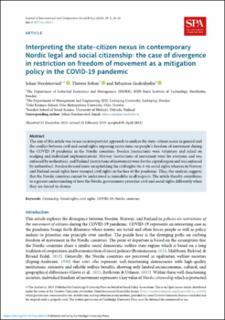Interpreting the state-citizen nexus in contemporary Nordic legal and social citizenship: the case of divergence in restriction on freedom of movement as a mitigation policy in the COVID-19 pandemic
Peer reviewed, Journal article
Published version
Permanent lenke
https://hdl.handle.net/11250/3117528Utgivelsesdato
2023Metadata
Vis full innførselSamlinger
- NOVA andre dokumenter [95]
- Publikasjoner fra Cristin [3269]
- SAM - Handelshøyskolen [392]
Originalversjon
Journal of International and Comparative Social Policy. 2023, 39 (1), 28-41. 10.1017/ics.2023.5Sammendrag
The aim of this article was to use an interpretivist approach to analyse the state–citizen nexus in general and the conflict between civil and social rights imposing restrictions on people’s freedom of movement during the COVID-19 pandemic in the Nordic countries: Sweden (restrictions were voluntary and relied on nudging and individual implementation), Norway (restrictions of movement were for everyone and was enforced by authorities), and Finland (restrictions of movement were for the capital region and was enforced by authorities). Sweden focused more on upholding the civil rights vis-à-vis social rights whereas in Norway and Finland social rights have trumped civil rights in the face of the pandemic. Thus, the analysis suggests that the Nordic countries cannot be understood as monoliths in all respects. The article thereby contributes to a greater understanding of how the Nordic governments prioritise civil and social rights differently when they are forced to choose.

